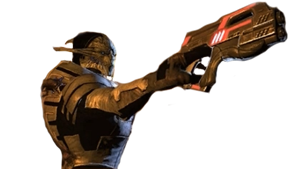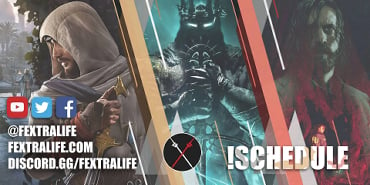Turians |
|
|---|---|
 |
|
| Type | Race |
| Homeworld | Palaven |
Turians are a Race in Mass Effect 2. Turians are known for their militaristic and disciplined culture. They are native from the world Palaven. Races in Mass Effect 2 have their own agendas, culture, religion, ways to govern etc. Since Commander Shepard is inevitably Human, the approach of the other Races towards Humanity is most of the time visible for the player.
Turians Information
Roughly 1200 years ago, the Turians were invited to join the Citadel Council to fulfill the role of galactic peacekeepers. The Turians have the largest fleet in Citadel space, and they make up the single largest portion of the Council's military forces.
As their territory and influence has spread, the Turians have come to rely on the Salarians for military intelligence and the Asari for diplomacy. Despite a somewhat colonial attitude towards the rest of the galaxy, the ruling Hierarchy understands they would lose more than they would gain if the other two races were ever removed.
Turians come from an autocratic society that values discipline and possesses a strong sense of personal and collective honor. There is lingering animosity between Turians and humans over the First Contact War of 2157, which is known as the 'Relay 314 Incident' to the Turians. Officially, however, the two species are allies and they enjoy civil, if cool, diplomatic relations.
Turian Biology
The Turian homeworld, Palaven, has a metal-poor core, generating a weak magnetic field and allowing more solar radiation into the atmosphere. To deal with this, most forms of life on Palaven evolved some form of metallic "exoskeleton" to protect themselves. Their reflective plate-like carapace makes Turians less susceptible to long-term, low-level radiation exposure, but they do not possess any sort of "natural armor". A Turian's thick skin does not stop projectiles and directed energy bolts.
Although life on Palaven is carbon-based and oxygen-breathing, it is built on dextro-amino acids. This places the Turians in a distinct minority on the galactic stage; the Quarians are the only other sapient dextro-protein race. The food of humans, Asari, or Salarians (who evolved in levo-amino acid-based biospheres), will at best pass through Turian systems without providing any nutrition. At worst, it will trigger an allergic reaction that can be fatal if not immediately treated.
Turian Culture
While Turians are individuals with personal desires, their instinct is to equate the self with the group, and to set aside all personal desires for the good of all.
Turians are taught to have a strong sense of personal accountability, the 'Turian honor' that other races find so remarkable. Turians are taught to own every decision they make, good or ill. The worst sin they can make in the eyes of their people is to lie about their own actions. Turians who murder will try to get away with it, but if directly questioned, most will confess the crime.
Turians have a strong inclination toward public service and self-sacrifice, so they tend to be poor entrepeneurs. To compensate, they accepted the mercantile Volus as a client Race, offering protection in exchanger for their fiscal expertise.
The Turian military is the center of their society. It is not just an armed force; it is an all-encompassing public works organization. The military police are also the civic police. The fire brigades serve the civilian population as well as military facilities. The corps of engineers builds and maintains spaceports, schools, water purification plants, and power stations. The merchant marine ensures that all worlds get needed resources.
Turian Government
The Turian government is a hierarchical meritocracy. While it has great potential for misuse, this is tempered by the civic duty and personal responsibility Turians learn during their childhood.
Turians have 27 citizenship tiers, beginning with civilians (client races and children). The initial period of military service is the second tier. Formal citizenship is conferred at the third tier, after boot camp. For client races, citizenship is granted after the individual musters out. Higher-ranked citizens are expected to lead and protect subordinates. Lower-ranking citizens are expected to obey and support superiors. Promotion to another tier of citizenship is based on the personal assessment of one's superiors and co-rankers.
Throughout their lives, Turians ascend to the higher tiers and are occasionally "demoted" to lower ones. The stigma associated with demotion lies not on the individual, but on those who promoted them when they weren't ready for additional responsibility. This curbs the tendency to promote individuals into positions beyond their capabilities.
Settling into a role and rank is not considered stagnation. Turians value knowing one's own limitations more than being ambitious.
At the top are the Primarchs, who each rule a colonization cluster. The Primarchs vote on matters of national import. They otherwise maintiain a "hands-off"policy, trusting their citizens on each level below them to do their jobs competently.
Turians enjoy broad freedoms. So long as one completes their duties, and does not prevent others from completing theirs, nothing is forbidden. For example, there are no laws against recreational drug use, but if someone is unable to complete their duties due to drug use, their superiors step in. Judicial proceedings are 'interventions.' Peers express their concern, and try to convince the offender to change. If rehabilitation fails, Turians have no qualms about sentencing dangerous individuals to life at hard labor for the state.
The Unificacion War
At about the time the Salarians and Asari were forming the Council, the Turians were embroiled in a bitter civil war. The Unification War, as it was later named, began with hostilities between the colonies furthest from the Turian homeworld, Palaven.
These colonies were run by local chieftains, many of whom had distanced themselves from the Hierarchy. Without the galvanizing influence of the government, the colonies became increasingly isolated and xenophobic. Colonists began wearing emblems or facial markings to differentiate themselves from members of other colonies and open hostilities became common.
When war finally broke out, the Hierarchy maintained strict diplomacy and refused to get involved. After several years of fighting, less than a dozen factions remained and the Hierarchy finally intervened. By that time, the chieftains were too weak to resist; they were forced to put an end to fighting and renew their allegiance to the Hierarchy.
Though peace was restored, it took several decades for animosity between colonists to fade completely. To this day, most Turians still wear the facial markings of their home colonies. As a point of interest, the Turian term "barefaced" refers to one who is beguiling or not to be trusted. It is also a slang term for politicians.
Turians Military Doctrine
Although they lack the brutality of the Krogan, the refined biotic skill of the Asari, and the adaptability of the Humans, the Turian military has formidable discipline. Officers and NCOs are "lifers" with years of field experience. Enlisted personnel are thoroughly trained and stay calm under fire. Turian units don't break. Even if their entire line collapses, they fall back in order, setting ambushes as they go. A popular saying holds: "You will only see a turian's back once he's dead."
Boot camp begins on the 15th birthday. Soldiers receive a year of training before being assigned to a field unit; officers train for even longer. Most serve until the age of 30, at which they become part of the Reserves. Even if they suffer injuries preventing front-line service, most do support work behind the lines.
Biotics are uncommon. While admired for their exacting skills, biotics' motives are not always fully trusted by the common soldier. The Turians prefer to assign their biotics to specialist teams called Cabals.
Command and control is decentralized and flexible. Individual squads can call for artillery and air support. They make extensive use of combat drones for light duties and VI-controlled fighters, and practice combined arms: infantry operates with armor, supported by overhead gunships. Strategically, they are methodical and patient, and dislike risky operations.
Tradition is important. Each legion has a full-time staff of historians who chronicle its battle honors in detail. The oldest have records dating back to the Turian Iron Age. If a legion is destroyed in battle, it is reconstituted rather than being replaced.
The Turians recruit auxiliary units from conquered or absorbed minor races, like the Volus. Auxiliaries are generally light infantry or armored cavalry units that screen and support the main battle formations. At the conclusion of their service in the Auxiliaries, recruits are granted Turian citizenship.
Turian Religion
Although Turians have a strict moral code, their belief in individual responsibility means that the concepts of good and evil are simply the individual's choice between egoistm and altruism in any given decision. The have no concept of "good" deities that encourage noble behavior or "evil" ones that tempt individuals to misdeeds.
Turians believe that groups and areas have "spirits" that transcend the individual. For example, a military unit would be considered to have a literal spirit that embodies the honor and courage it has displayed. A city's spirit reflects the accomplishments and industry of its residents. An ancient tree's spirit reflects the beauty and tranquility of the area it grows within.
These spirits are neither good nor evil, nor are they appealed to for intercession. Turians do not believe spirits can affect the world, but spirits can inspire the living. Prayers and rituals allow an individual to converse with a spirit for guidance or inspiration. For example, a Turian who finds his loyalty tested may appeal to the spirit of his unit, hoping to reconnect with the pride and honor of the group. A Turian who wishes to create a work of art may attempt to connect with the spirit of a beautiful location.
Turians enjoy absolute freedom of religion and can practice whatever appeals to them so long as it does not impede anyone's ability to perform their duties. There are many practitioners of the Asari siarist philosophy. Since opening dialog with the human Systems Alliance, some Turians have embraced Confucianism and Zen Buddhism.
Notable Turians
Turians Notes and Tips
- Notes and tips go here
